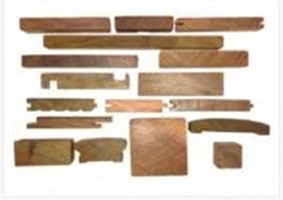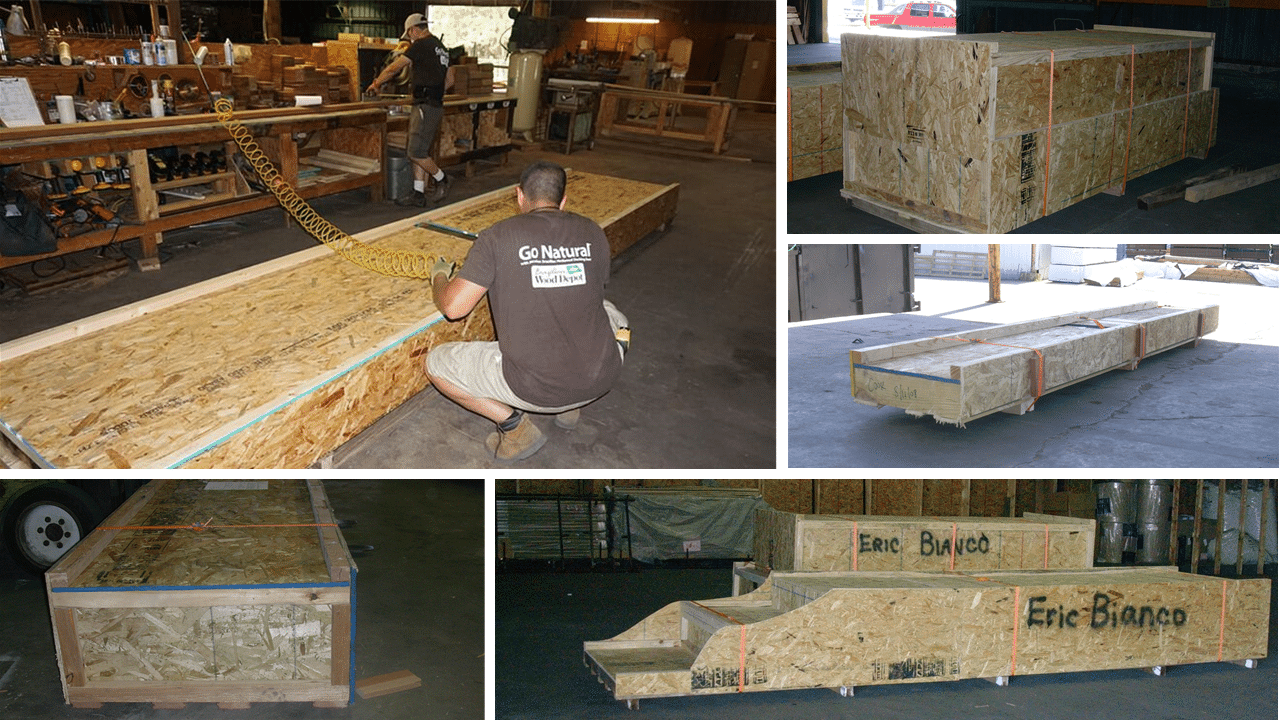Brazilian Wood Depot
6770 Buford Highway NE
Atlanta, GA 30340
- About Tigerwood
- Full Weather Color Change Progression
- Benefits of Tigerwood
- Tigerwood Decking vs Other Decking
- Finishing and Maintenance
- Working with Tigerwood
- RealTigerwood©
- Decking Profiles
- Deforestation, Sustainability, and Illegal logging
- Architect and Design Library
- FAQs
- Quotes and Samples
- Shipping and Deliveries
- Photos and Videos
About Tigerwood
Tigerwood (Muiracatiara) decking lumber is a beautiful exotic Brazilian hardwood which provides one of the most unique wood grain patterns you will ever see. Because of its incredible beauty, Tigerwood lumber it is highly sought after for both interior and exterior applications. Brazilian Tigerwood is so called because it has a reddish/orange background with dark vein striping which gives it a tiger-like look. Tigerwood hardwood will darken slightly to a redder tone with exposure to sunlight.
Tigerwood, stocked in Atlanta from at Brazilian Wood Depot creates stunning decks. This striated hardwood shows incredible streaks of copper, rustic browns, and blacks, reminiscent of the tiger coat of its namesake.
Color and Appearance– Brazilian Tigerwood exhibits a large degree of color change with a pronounced darkening of the background under the stripes from an orange-tan to a deep reddish-brown color. Color maintenance can be difficult to achieve in all-day, direct sunlight situations like uncovered rooftop decks and uncovered docks. Areas that have at least some shade (from trees, the home, an awning, or roof) are usually the best applications for Tigerwood.
Tigerwood is considered the highest quality, best natural wood decking material on the market today. It is also one of the most popular species for decking we stock at Brazilian Wood Depot. On this page, you’ll learn more about Tigerwood decking, the benefits it provides and other useful information to help get you started.
Weather Color Change Progression
Sunlight has a bleaching effect on nearly everything it comes into contact with. Hardwood decking boards are no exception. The purpose of this demonstration is to show the sun’s effect on Brazilian Hardwood Decking and what to expect from reoiling. These boards were left on the roof of our building for 12 weeks to simulate a deck with heavy sunlight and weather exposure. All the boards began with one coat of Messmer’s UV Plus (Natural). After the 12th week, another coat was applied to half of each board.
The video to the right includes more details about how I did the demonstration and other interesting findings.
Fresh Deck Boards
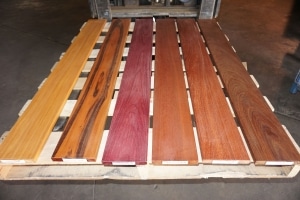
Garapa
Tigerwood
Purpleheart
Massaranduba
Cumaru
Ipe
Fresh Decking Boards Before Sunlight Exposure Finished with One Coat Messmer’s UV Plus Natural
3 Weeks Exposure
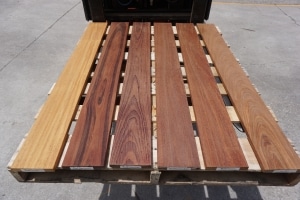
Ipe
Cumaru
Massaranduba
Purpleheart
Tigerwood
Garapa
Three weeks of full sunlight and weather exposure.
6 Weeks Exposure
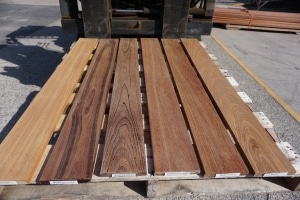
Ipe
Cumaru
Massaranduba
Purpleheart
Tigerwood
Garapa
Six weeks of full sunlight and weather exposure.
9 Weeks Exposure
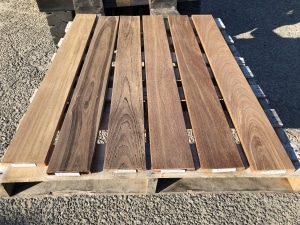
Ipe
Cumaru
Massaranduba
Purpleheart
Tigerwood
Garapa
Nine weeks of full sunlight and weather exposure. Boards are now almost grey, but certainly have lost their original richness, in tone.
12 Weeks Exposure & ReOiled
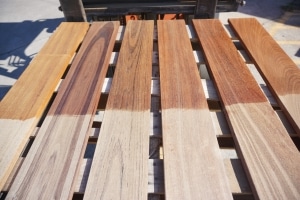
Ipe
Cumaru
Massaranduba
Purpleheart
Tigerwood
Garapa
At 12 weeks, the boards are fairly uniform in their grey color. I applied oil to the top half of these boards so you can see the difference between the washed-out 12-week appearance and the newly oiled appearance.
Benefits of Tigerwood Decking
Tigerwood decking has a number of qualities that make it stand out as the superior outdoor construction material.
- All Natural- Unlike composite decking, which is a combination of wood pulp and plastic, a non-recyclable material that pollutes our planet or reclaimed lumber that is loaded with toxic chemicals known to harm surrounding plant and animal life, Tigerwood is 100% natural. It is ideal for repurposing, bio-degradable and does not create any biproducts that can harm the environment. No chemicals or plastics whatsoever, just 100% real wood. That’s why we say, “Go Natural!”
- Hardness- Tigerwood is not as hard as Ipe, but it is extremely hard compared to domestic hardwoods with a Janka Hardness rating of up to 2,170. Compare that to Oak, at about 1,200. This extreme hardness lends to its dimensional stability, long lifespan, and natural weatherproof properties. Pressure treated wood is known for substantial expansion and contraction with seasonal changes. This process destroys the cell structures from the center of the boards, outwards. It also increases the rate of decay. This movement is also responsible for creating raised wood grain that can be painful to walk on without shoes. Raised grain is a common problem with pressure treated woods but does not occur with tropical hardwoods like Tigerwood. Composite and plastic decking will also expand and contract significantly over time which compromises the rigidity. This eventually leads to boards drooping between the joists. Tigerwood, being so hard, will expand and contract some, but very little. Minimal movement is one key element to Tigerwood’s incredible longevity.
- Longevity- Tigerwood is renowned for its ability to last many decades even in extreme weather conditions. Density and hardness, as discussed above, plays a large role in that. Natural resistance to water penetration and rot/decay also contributes to its longevity. The forests, from which they evolved, experience 100-400 inches of rain per year. That is up to 8-10 times more than anywhere in the United States. Evolutionary responses to this heavy rainfall have made this wood naturally resistant to water penetration, mold, rot and decay.
Board Replacement- Many people fail to consider how board replacement can be a HUGE obstacle with alternative deck materials like PT or composite. Let’s say you drop the hot contents of a grill on your deck and it damages the boards beyond repair. Unfortunately, if you don’t have a Tigerwood or tropical hardwood deck, you’re in for a rude awakening. When you replace a PT or Composite deck board, it will stand out from the others, dramatically. These materials are all very consistent and continue fading over time. So, the new boards will ALWAYS stand out from the others. You are left with a deck that has very obvious patchwork. Tropical hardwoods vary from board to board, so replacing boards is no big deal. They may stand out from the others for a couple of months, but before long no one will be able to tell the new boards from the original ones. This benefit is specific to real, natural woods. Board replacement is also a common problem with prefinished and engineered wood flooring.
- Insect Resistance- Tigerwood and other tropical hardwoods, are naturally insect resistant. Domestic lumber is treated with chemicals to deter wood boring insects. Tigerwood evolved in forests with insects much more proficient at wood-boring than their North American counterparts. Very few insects in their natural habitat are capable of infiltrating their tough wood fibers and certainly, the domestic insects of the United States are no match. This is true for most tropical hardwoods.
- Fire Resistance- For many states in southwestern United States, fires are a large factor driving construction material decision making. This also holds true for large commercial projects in urban areas. Tigerwood is very resistant to flame spread. Tigerwood typically achieves high B ratings in Flame Spread rating tests. This usually means that prolonged exposure to flames may cause damage, but flame spread is minimal, at best. Plastic, composite and pressure treated lumber typically receive the lowest flame spread ratings C Class. Ipe and Tigerwood are very similar, but Ipe typically outperforms Tigerwood in this metric. Watch Matt Risinger’s YouTube video demonstrating Ipe’s incredible resistance to fire.
- Forest Stewardship- Tigerwood is sourced from the tropical forests of South America, Brazil in particular. Concerns with harvesting Tigerwood from the “lungs of our planet” are well warranted. The truth is, Brazil’s hardwood timber industry may be the forests best protection from clear-cut uses like Cattle and Agriculture. When Tigerwood is harvested and regrown in its natural habitat, that habitat is protected by both the organization that replanted and the local or federal government. Without responsible forestry management, forest lands are more likely to be cleared for grazing cattle and planting crops. Each purchase of Tigerwood, or other tropical hardwood, from conscientious hardwood dealers like Brazilian Wood Depot contributes to the value of naturally forested lands.
- Cost- Contrary to popular belief, Brazilian Hardwoods are not more expensive than the alternatives. The opposite, in fact. Pressure treated lumber is considered to last about 5-7 years before boards begin to deteriorate and rot. Plastic and composite boards will typically begin to fade and deteriorate within a few years. A composite deck is unattractive and nearly unusable after about 8 years. Alternatively, Tigerwood is known to last from 25-75 years, depending on the environmental conditions. When you consider the cost of replacing pressure treated or composite boards through the life of just one installation of Tigerwood, Tigerwood is far, far more cost effective. The front-end cost of Tigerwood decking is generally the same as the low-end composites and outperforms them in every measurable metric. Pressure treated lumber is cheaper than Tigerwood, but you’ll replace the PT boards 5 times in the life of one Tigerwood deck. So, is Tigerwood the most cost-effective decking? Yes, usually in the short-term, but always in the long-term.
Tigerwood Decking V.S. Other Decking
| REALTigerwoodTM | CCA-TREATED PINE | COMPOSITE DECKING | |
| Type | Hardwood | Softwood | Plastic |
| Maintenance | Low | High | Low |
| Decay Resistance | High | Varies | Varies |
| Termite Resistance | High | Varies | Varies |
| Strength | High | Medium | Low |
| Movement in Service | Low | High | High |
| Fire Rating Class | High | Varies | Low |
| Hardness | 2,170 | 690 | 940-1,390 |
For a more comprehensive comparison of decking materials, visit: Composite Decking vs. RealWood
How does Ipe decking compare to Composite decking? Visit our Composite Comparison page.
Compare Ipe Decking to Plastic/Composite Decking
(Being that Tigerwood is very similar to Ipe, the following article comparing Ipe to composite materials is a very good reflection of how Tigerwood compares to composite material.)
Ipe is one of the hardest, commercially available, woods in the world. With a Janka hardness rating of 3680, Ipe can withstand the most extreme elements and commercial wear and tear. Currently, there are no decking options that compare to Ipe’s many benefits. Plastic Decking is one alternative, but it has many downsides…
Read More
To start with the obvious, Trex and other Plastic or Composite Decking alternatives offer no natural features. Plastic or Composite options are either all grey or all beige or somewhere in between. All the boards will be exactly the same color with the exact same printed grains. Ipe Decking and other Brazilian Hardwood Decking offer only real, natural wood colors with real, natural grains. This means a beautiful variation of boards with each a unique grain pattern on every deck. The next downside to Plastic or Composite Decks is their inability to be repaired. If a board(s) gets damaged, scratched, stained or broken, the damaged piece cannot be fixed because Plastic and Composite Decking fades with time and exposure to the elements. If you were to replace one board on a Plastic Deck or Composite Deck, it would stick out, very obviously, from the other boards. The new boards would be the ‘manufactured’ color, while the others would be faded. This disparity will never even out. Moreover, Plastic and Composite Decking cannot be pressure washed or sanded to restore color. You are never really able to bring a Plastic or Composite Deck back to its original condition without replacing all of the boards.
Ipe Decks, on the other hand, can easily be brought back to their original condition. Keeping with the scenario outlined above, if a board on an Ipe Deck is damaged and needs to be replaced, all you would need to do is get a replacement board to put in its place. Because the color of Ipe varies from board to board, it would not stand out from the other boards at all. It’s natural variability in color lends to its advantage if a board ever needs to be replaced. Alternatively, if the board was scratched or stained, one merely needs to sand the surface of the stained board(s) and reapply the UV oil to bring them back to their original condition. Ipe Decks last forever not only because of their resilience to rot and decay, but also because the boards CAN be repaired, a quality not found in any other decking material. Another aspect that many people fail to consider before installing a deck is Heat Dispersion and Flammability. Wood is the best decking material for disbursing heat making the deck cooler to walk on and Ipe also has a similar fire rating to concrete. Basically, it’s a naturally non-combustible material. Plastic and composite decking is very hot and can create a fire hazard if installed outside a UV reflecting window.
Finally, the last major downfall of Plastic and Composite decks, sagging and drooping. The chemical combinations for Plastic and Composite decking options have changed over the years in an attempt to avoid problems like, insects, mold, and rot. Unfortunately, one problem that has yet to be tackled by even the most advanced Plastic or Composite Decks is sagging and drooping. Sagging and drooping refers to the pendulous deformation of deck boards between the joists. As far as longevity goes, this is the main problem for Plastic and Composite Decks. After several years, the chemical components in the decks breakdown which compromises the rigidity of the boards. It can compromise the strength in such a dramatic manner that the boards themselves loose their ‘straightness’ and droop between the joists. This is an extremely well-known problem for Plastic and Composite decks that has never been successfully addressed. Ipe Decking is 100% natural. There are no non-organic chemicals to breakdown. Ipe’s high density and hardness that lends to its’ incredible dimensional stability is why Ipe decks outperform Plastic and Composite decks in regard to longevity, 10 to 1. These are just a few reasons that Ipe Decks are the preferred choice over Plastic and Composite Decks. All considered, there really is no comparison between an Ipe Deck and a Plastic or Composite Deck.
Contact us with any questions on comparisons of Ipe and composite decking.
Finishing and Maintenance
To oil or not to oil, that is the question. With Tigerwood or any other tropical hardwood from Brazilian Wood Depot, you have basically two options when it comes to maintaining your deck, but you don’t have to stick with either one. You can either skip the oiling and let the boards go a beautiful silvery-grey or use oil to maintain the natural brown colors. Below, I’ll go into what both options mean for you and your deck.
First, what happens when you do not use a UV protectant oil? The purpose of UV Oil is to protect the wood from ultraviolet rays emitted by the sun. These rays eventually ‘bleach’ the boards of their natural brown color. What’s left, after significant sunlight exposure, is a beautiful silvery-grey surface that has a natural ‘reclaimed’ appearance.
Typically, the board colors become more consistent with more time left in the sun without UV protection. The ‘greying’ process will not affect the structural integrity, lifespan, or water resistance of the boards. Let’s say, when the deck was originally installed, you didn’t apply the oil because you wanted the deck to turn grey. You can bring Tigerwood back to its original condition. It may require a cleaning before oiling, just follow directions in the video, above.
Second, you do want your deck to hold its natural color. First off, you’ll want to use a UV Oil. It is not a “stain” nor a “sealer”. These terms are not technically accurate because UV Oil is not meant to provide a color change like “stain” or water protection like a “sealer.” Tigerwood and similar tropical hardwoods have natural colors and they are naturally resistant to water penetration, so stains and sealers are not only unnecessary- they are improper.
If you are planning to maintain the natural color, we recommend using Messmers Ipe Hardwood Deck Stain. There are other products that also work to protect the natural colors of Tigerwood and tropical hardwoods, but this is the product we have been recommending for +10 years. It comes in three colors, but the preferred color is “Natural.” The finish protects the wood well and contains transparent iron oxide pigment. This pigment absorbs UV radiation yet at the same time will allow visible light to pass through it. The staining results you’ll get are a finish that highlights the natural beauty of the Tigerwood wood and at the same time protects it. Your deck will not fade in the sun as this product has excellent resistance to UV degradation. Maintaining the color of your deck typically involves annual oiling followed by periodic cleaning every 2-3 years. For more information on how to maintain the color of your Tigerwood deck see the video above, Ipe Deck Maintenance (Ipe, Cumaru, Massaranduba, Purpleheart, Tigerwood, and Garapa)
FULL Cleaning and Oiling Instructions PDF
Choosing to finish your deck or leave it unfinished is a personal choice and you can’t go wrong either way. Brazilian Wood Depot is here to help you decide whether or not to stain your Tigerwood deck. We will be happy to discuss your options.
 Working with Tigerwood
Working with Tigerwood
Storage and Handling
For out-of-state (outside of GA) installation, it is required that the materials acclimate to the climate conditions of the job site before installation; allow materials to acclimate to the job-site climate for ten (10) days prior to installation. Utilizing spacers or stickers between boards to allow air movement and natural drying also aids the acclimation process. Always store materials flat and keep dry and covered prior to installation. Installing wet or saturated boards may result in shrinkage. Refer to the Installation Requirements document for more information.
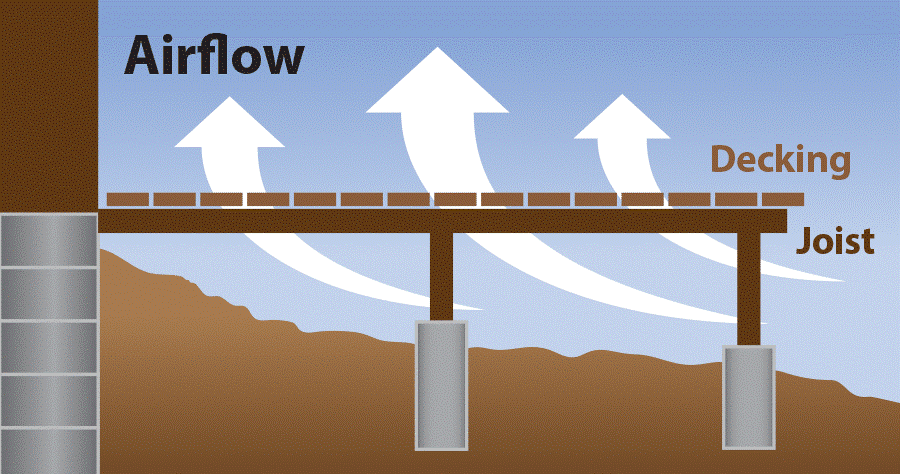
When designing your deck, you must provide for adequate ventilation to assure long term stability and avoid cupping. Proper air ventilation allows air to flow in from outside the deck area and under the joists to evaporate moisture. Gently sloping the soil under the deck away from the house and covering the soil with plastic is recommended for any type of deck installation. Allow a 1/8″ gap between standard deck boards for drainage and airflow. More detailed instructions can be found on the Installation Tab and the Installation Requirements documents. There are a number of different fastening methods; Face Screws, Kerf and Clips, Grabber Bars, Camo, or ProPlug. For a more detailed description of these fasteners visit the Accessories Tab.
RealTigerwoodTM
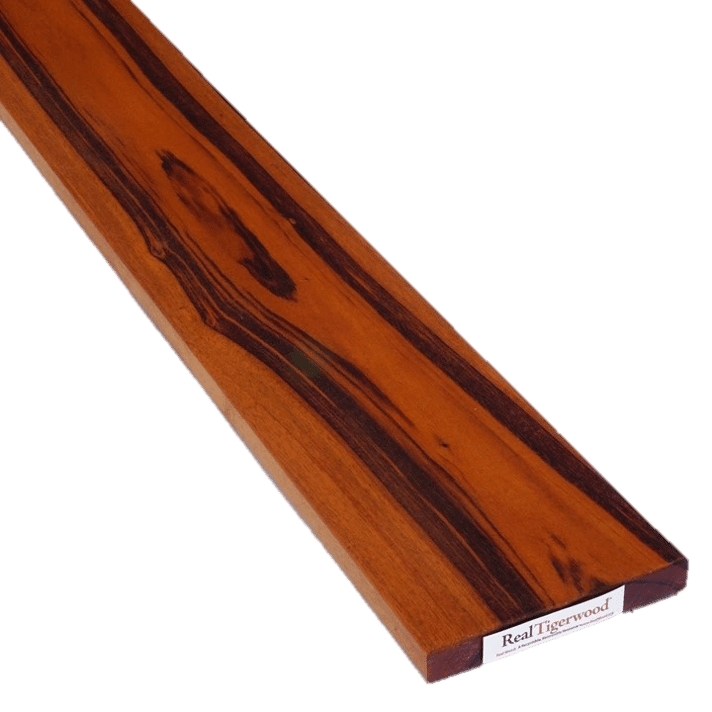
At Brazilian Wood Depot, we also place an emphasis on the proper shipment of our lumber, to ensure that your Tigerwood decking material arrives in the quality and excellent condition you deserve, preventing costly setbacks, stresses and inconveniences. With special wood crates for shipping and transportation, low overhead costs and large number of shipments, we can pass on great savings to you, while ensuring a smooth delivery process. We deliver Tigerwood across the entire United States.
Ultimately, with RealTigerwood for your home, you’ll be receiving a beautiful, hassle-free and long-lasting choice that will make your deck the envy of the neighborhood, but also simply a wise investment.
Call 770-242-0045 for any other information or for specific pricing on Tigerwood.
Lumber Profiles
Brazilian Wood Depot carries a variety of profiles. The standard decking profile for Tigerwood and other tropical hardwoods is “1×6” (3/4” x 5.5”). 1×6 is appropriate for Joist spacing of 12” or 16”. Typically joist spacing greater than 16” is not allowed by code, but there are exceptions. For joist spacing greater that 16” OC, consider using “5/4 x 6” (1” x 5.5”). The additional board thickness contributes to the overall span strength of the decking. Brazilian Wood Depot always stocks both 1×6 and 5/4 x 6 Tigerwood decking. For projects that require extra attention to water runoff or moisture equalization, see RainAway Decking and Deck Tiles.
Brazilian Wood Depot also carries a number of different profiles to accent different features of your deck like stair risers, balusters, railing sections, handrails, facia, posts, etc… These profiles are generally only offered in Ipe. Ipe dimensional lumber accents Tigerwood decking perfectly and is the preferred choice for the deck features mentioned above. Refer to the Profiles and Dimensions document for profile availabilities.
Ipe: Deforestation, Sustainability and Illegal Logging
(The following article speaks on Tropical Hardwoods, in general, which also includes Tigerwood)
You may be familiar with Ipe as the “King of Woods.” A species with almost unbelievable characteristics- natural resistance to rot, insect attack, and mold with density and hardness comparable to concrete. These features give Ipe and other tropical hardwoods the ability to outlast pretty much everything while providing unrivaled beauty and character. All of this is true. Ipe has been a staple in the decking, flooring, siding and furniture industries for many years for these reasons. Furthermore, in recent years, the prices of tropical hardwoods like Ipe, Cumaru, Purpleheart, Tigerwood, Massaranduba and Garapa will beat out even the mid-tier composite decking and siding alternatives. If that were the end of the story, these tropical hardwoods would be the market leaders for outdoor construction, hands down. Unfortunately, some narratives paint a darker picture of Ipe that is both misleading and endangers our native tropical forests…
Architect and Design Resources
We are very proud to announce that Brazilian Wood Depot, with the help of CADdetails.com, has made specifying Brazilian Hardwood Decking and Siding much easier!
Incorporate Brazilian Hardwood Decking and Siding products into your
plans quickly and easily by downloading our design files from
CADdetails.com. CADdetails is specifically designed for architect and
design professionals aimed at getting manufacturer-specific product
information for working plans.
On our Microsite, you’ll find CADs, Specifications, BIMs, 3D Models, and other design-related media for Brazilian Wood Depot and BWD
products. This database will continue to grow in the coming weeks
and months.
Click here to visit our Architect and Design Library at CADdetails.com
Lucy’s Most Frequently Asked Questions
How do I clean and refinish my deck?
See the cleaning and maintenance instructions here. These instructions are accompanied by two demonstration videos! This document will tell you everything you need to know from the products we recommend to the processes that have had the most success.
Maintenance of hardwood decking is nearly always the same, regardless of the species.
Should I pressure wash my deck before finishing it?
NO. Pressure washing it can leave streaks, potentially tear up the surface of the wood and will not clean as deeply as the cleaner.
Where does Brazilian Wood Depot Ship?
We ship to all areas of the US.
What is BWD’s return policy?
Please see our Purchase Policy for detailed information.
How does the cost of Composite Decking compare to Hardwood Decking?
The range of composite decking prices covers about the same range of the different hardwood decking options. Taking into consideration the long life, durability, beauty, and stability of hardwood decking compared to composite: hardwood decking costs less over the lifetime. Visit our comparison page for more information.
For additional FAQ’s visit our FAQ’s Tab.
Quotes and Samples
Brazilian Wood Depot is here to help! We pride ourselves on superior customer support and turning around samples, quotes, and orders faster than anyone else. Please call us for samples or quotes, 770-242-0045.
Generally, all we need to get started on pricing your deck is the answer to a few, basic questions. We can help you answer these questions too:
- What species? With Six incredible Brazilian Hardwood species, deciding on just one can be a difficult task. I’d recommend familiarizing yourself with the different options on the Decking Tab or this Video.
- How will you fasten the boards? Whether you are using face screws, hidden clips, grabber bars, or the Camo system, we’ve got you covered. The decision is yours to make and your installer can also help guide this decision based on their preferences. Visit the Accessories Tab for more information on fastening methods.
- What are the basic dimensions of the deck and the joist spacing? Obviously, we’ll need to know the size of the deck to get things started. Joist spacing information allows us to quote accurate fastening quantities.
- Additional Deck Features? You don’t need to know all the intricate details of your deck design to get a basic quote, but if you do have the information it can help make the quote more accurate. Additional features would include; steps, risers, posts, railing sections, handrail, and facia.
This is all we need to get you stared on pricing your new deck. Again, we’re here to help you make the best decisions for your deck. You can reach us anytime at, 770-242-0045.
Shipping and Delivery
Brazilian Wood Depot has the most robust shipping process, IN THE INDUSTRY! There’s no debate about that and we know it! Every LTL shipment is fully crated to prevent damages.
We are now also offering LIVE 4G GPS TRACKING on LTL shipments! We are the only distributors in the industry that offer this service! You’re going to love it!
Read more about our robust shipping process, www.bwdepot.com/shipping


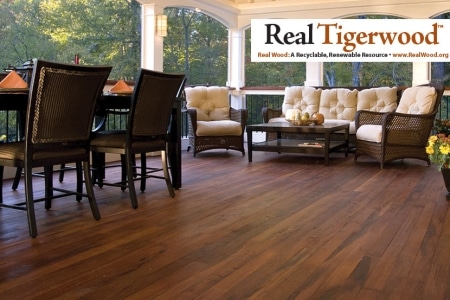 Board Replacement- Many people fail to consider how board replacement can be a HUGE obstacle with alternative deck materials like PT or composite. Let’s say you drop the hot contents of a grill on your deck and it damages the boards beyond repair. Unfortunately, if you don’t have a Tigerwood or tropical hardwood deck, you’re in for a rude awakening. When you replace a PT or Composite deck board, it will stand out from the others, dramatically. These materials are all very consistent and continue fading over time. So, the new boards will ALWAYS stand out from the others. You are left with a deck that has very obvious patchwork. Tropical hardwoods vary from board to board, so replacing boards is no big deal. They may stand out from the others for a couple of months, but before long no one will be able to tell the new boards from the original ones. This benefit is specific to real, natural woods. Board replacement is also a common problem with prefinished and engineered wood flooring.
Board Replacement- Many people fail to consider how board replacement can be a HUGE obstacle with alternative deck materials like PT or composite. Let’s say you drop the hot contents of a grill on your deck and it damages the boards beyond repair. Unfortunately, if you don’t have a Tigerwood or tropical hardwood deck, you’re in for a rude awakening. When you replace a PT or Composite deck board, it will stand out from the others, dramatically. These materials are all very consistent and continue fading over time. So, the new boards will ALWAYS stand out from the others. You are left with a deck that has very obvious patchwork. Tropical hardwoods vary from board to board, so replacing boards is no big deal. They may stand out from the others for a couple of months, but before long no one will be able to tell the new boards from the original ones. This benefit is specific to real, natural woods. Board replacement is also a common problem with prefinished and engineered wood flooring.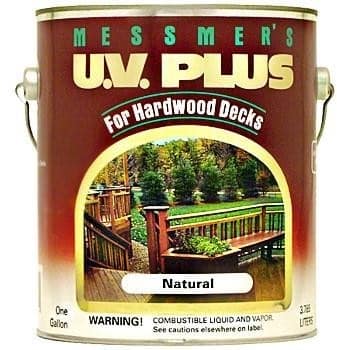
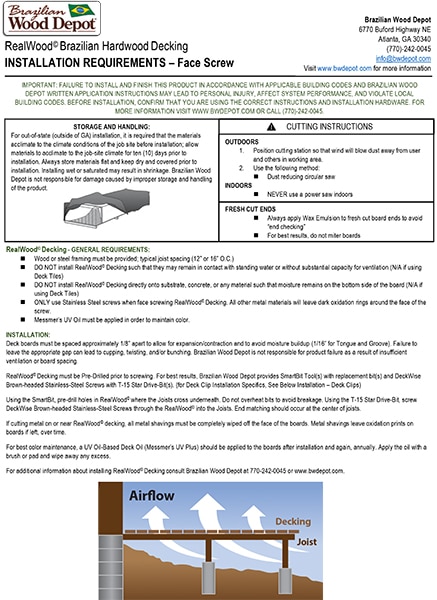 Working with Tigerwood
Working with Tigerwood